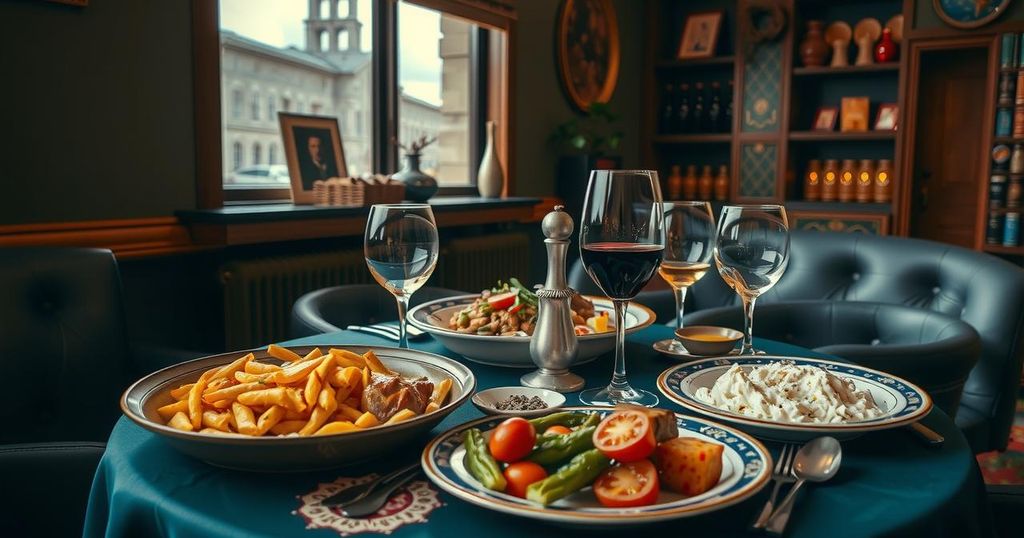Kazakh Cuisine: A Culinary Journey Through Home and Heritage

Almaty’s Auyl restaurant, celebrated for its neo-nomadic Kazakh cuisine, captures the essence of home and hospitality crucial to Kazakh culture. Aida Haidar, of The Astana Times, highlights the significance of local flavors, particularly horse meat, and encourages visitors to embrace this culinary heritage. With establishments like Qazaq Gourmet and Selfie showcasing traditional and modern dishes alike, experiencing Kazakh food is a vital part of engaging with the nation’s rich cultural narrative.
Kazakh cuisine is a rich tapestry of flavors, deeply rooted in the culture and history of the Kazakh people. Almaty’s Auyl restaurant exemplifies this culinary heritage, having recently been recognized as one of the world’s most beautiful dining establishments. Aida Haidar, the News Editor at The Astana Times, emphasizes the significance of food in conveying the essence of home for Kazakhs, especially through traditional dishes featuring horse meat, a staple that may seem exotic to outsiders. This article serves as a guide for foreign visitors eager to experience the warmth of Kazakh hospitality through food. The culinary landscape of Kazakhstan has evolved considerably, merging traditional techniques with modern interpretations. This transformation is not only a reflection of historical influences from the Great Silk Road but also a revival of local customs as chefs draw inspiration from nature and regional ingredients. The rise of establishments dedicated solely to Kazakh cuisine reflects a cultural renaissance, inviting both locals and tourists to experience the authentic flavors that define the nation. For visitors in Almaty, Auyl is a must-visit destination that offers a genuine immersion into the warm, inviting atmosphere of Kazakh hospitality. The restaurant’s design reflects a neo-nomadic aesthetic, encouraging guests to engage with their surroundings while partaking in signature dishes such as baursak, balqaimaq, and marrow bones. These culinary delights encapsulate the hearty essence of Kazakh cuisine, promising to energize and comfort. Astana also presents enticing culinary options, particularly for those seeking traditional experiences. At Qazaq Gourmet, guests can savor beshbarmak, a quintessential dish made with horse meat and dough, emblematic of Kazakh culture. This dish is often a centerpiece during significant events, evoking a sense of nostalgia and comfort. The accompanying horsemeat broth offers not just nourishment but renewal for the spirit. In addition to traditional fare, the Selfie restaurant in Astana provides a modern twist on Kazakh cuisine, accompanied by stunning views of the city. The menu features local ingredients in a luxurious dining experience, inviting guests to explore unique dishes like horse heart tartare, embodying the spirit of contemporary Kazakh culinary innovation. Kazakh tea, a cultural cornerstone, symbolizes hospitality and warmth, serving as a unifying element within Kazakh society. Visitors are encouraged to experience this comfort through creative interpretations of tea, such as ice cream infused with traditional flavors. However, nothing rivals the warmth of being welcomed into a Kazakh home, where homemade beshbarmak surpasses even the finest restaurant offerings, showcasing the profound familial connections that food fosters. Through the lens of Aida Haidar’s exploration, Kazakh cuisine emerges as a vibrant reflection of identity and history. The communal aspect of sharing meals reinforces a sense of belonging, making each dining experience not merely a meal, but a poignant reminder of home.
Kazakh cuisine is characterized by its emphasis on meat, particularly horse meat, reflecting the nomadic lifestyle of the Kazakh people and their historical reliance on hearty sustenance in harsh climates. This culinary tradition has evolved over centuries, absorbing influences from diverse cultures due to Kazakhstan’s strategic position along the Great Silk Road. In recent years, there has been a resurgence of interest in traditional Kazakh dishes, with chefs embracing local ingredients and flavors. Dining establishments are increasingly focused on offering authentic experiences, celebrating the deep-rooted connection between food and Kazakh cultural identity.
In conclusion, Kazakh cuisine represents much more than mere sustenance; it embodies the spirit of community, heritage, and identity for the Kazakh people. The evolution of culinary practices, coupled with a renewed appreciation for traditional dishes, allows visitors to engage deeply with the culture. Through the warmth of shared meals and the richness of flavors, Kazakh food connects individuals to both the past and the vibrant present of this unique nation.
Original Source: astanatimes.com







